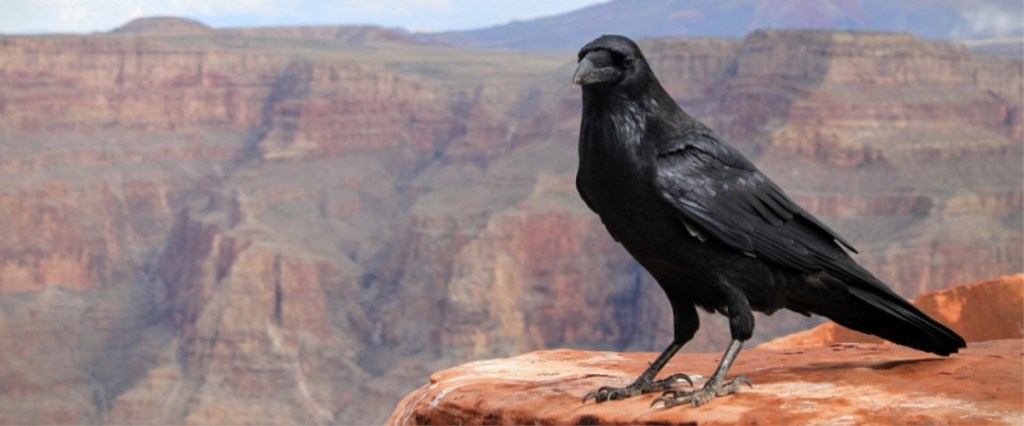Crows and other birds in the corvid family have long been both used and feared by the human race. We call a flock of the a “murder,” after all, and they’re just so big.
Sure, Hitchcock didn’t help matters, but the more you learn about crows, the more you realize there’s actually more than a few reasons for the inky black birds to unsettle you – and almost all of them have to do with their freakish intelligence.
Kaeli Swift, a lecturer at the University of Washington, wrote her doctoral thesis on crow behavior. Below are three of her favorite examples of just how eerily smart corvids are.
1. They remember human faces.
https://www.instagram.com/p/B1RXSiVJPeJ/
Wildlife biologists learned this fact by conducting a rather simple experiment that reduced humans to bad and good using rubber masks. There was a “dangerous” caveman mask and another of former Vice President Dick Cheney meant to be seen as “neutral.”
Researchers wearing the caveman mask trapped and banded individual American crows before releasing them, and even though the birds weren’t harmed, Swift admitted to NPR that “it’s still a scary experience for them.”
When researchers returned to the area later wearing the caveman mask, the birds began to “alarm-call…[and] dive-bomb that person,” while the Cheney mask was ignored.
Researchers are sure it was the faces, too, and not something else the crows were remembering – people of different genders, body types, and hair colors all wore the mask, but that didn’t convince the crows a different person was be behind it. Not even turning it upside down could fool them.
“For a brief moment, the crows seemed a little confused, and then they would just tilt their head upside down and then they’d start an alarm-calling.”
They repeated the experience years later, after most of the original crows would have died, and the murder responded to the caveman masks in exactly the same way, which suggests they also have a way of communicating about specific persons to future generations.
Wild.
2. They have funerals for their dead.
https://www.instagram.com/p/B6LZnerHkBH/
Crows mark the passing of their brethren in two ways: alarm calls or loud scolds, and mobbing.
Mobbing happens when multiple crows hear an alarm call, gather around the dead crow, and begin to scold, says Swift, and the practice “usually lasts around 15 to 20 minutes.”
Scientists like John Marzluff, who designed the facial-recognition study, don’t think the crows are mourning – they think they’re figuring out what happened to the dead crow and spreading the word about potential dangers to each other.
They tested this hypothesis with an experiment where they fed crows in a certain area for a few days before wearing a mask and bringing a dead crow to the feast. After that, the crows would run off anyone wearing that mask, regardless of whether they had food.
“Basically, if they saw a person holding a dead crow would they learn that person’s face and go, you know, guilty by association,” Swift told NPR.
The birds were also slower to return to the feeding grounds at all once they associated them with danger, which Swift posits “suggests that crows did indeed learn from that experience, that although those Cheetos might be really tempting, because there was a dead crow here earlier, I should probably be extra careful before I come down and get my snack.”
If only it were as easy to deter myself from the bag of Cheetos.
3. They create and use tools.
https://www.instagram.com/p/B4WbbYUgzz8/
You might figure that only primates can make and use tools because of the whole thumbs thing, but crows are ready to surprise you with their dexterity and ingenuity. Swift told NPR that New Caledonian crows are basically “flying primates,” and can create hooked tools to root out bugs buried in wood.
“There’s a lot of animals that use tools, but modifying a material for a specific purpose, that’s much more complicated,” and that she and other researchers believe crows might be “the only other animal besides early humans that habitually make hooks in the wild.”
See what I mean? It’s not that I think they’re going to overpower and peck me to death, but the truth is, just knowing they’re capable of organizing such an attack is enough to keep me standing in awe of corvids at a great distance.
Because they really are amazing animals, don’t you think?






